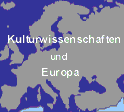 |
Cultural Studies and Europe
Cultural studies, education and scholarship
|

|
Education and scholarship represent continuous and constantly changing
processes of acquisition, change and production of human operative knowledge.
Cultural studies are particularly challenged in the current highly charged
atmosphere characterised by deep divisions in perception between those
still adhering to a partially outdated "humanistic" educational ideal of
the 19th century, and those pursuing a shortsighted scientistic conception
of an economics-driven conveyor belt production of industry and service
oriented skills. It is here that cultural studies must present a new educational
and intellectual concept and directives for its concrete realisation. Education
and scholarship policies based on cultural studies can only succeed in
the twenty first century when they proceed from a comprehensive understanding
of culture as well as of the dynamics in all people of cognition of culturally
conditioned knowledge. That human life and learning is increasingly subject
to an accelerating dynamic of change is itself becoming a principle of
education: in future, curricula for all levels of education must be so
structured that they can be continually modified to suit new circumstances
in and requirements of the information society. These modifications must
be able to proceed free of administrative, political or legal hurdles.
However, at the same time a common invariant basis must be maintained,
namely through a perspective oriented by cultural studies: to produce knowledge
means to produce culture. These cultures do not remain abstract ideas however,
but are lived out concretely - in the entertainment culture, in industry,
the economy, in the scientific culture of universities and research centres,
in the culture of government and in all other manifestations of cultural
processes. The increasing importance of technology in human life requires
radical transformation in all educational and scholarly endeavours. The
Internet has long been one of the most important media for this process,
and new cultural forms for interactive learning have long since emerged
in the Internet. Those seeking knowledge are increasingly taking the initiative
in learning processes, while knowledge providers are largely losing their
monopoly as bearers of the Holy Grail of learning. Their position is instead
increasingly that of attendant to those pursuing knowledge, a position
which allows them to learn alongside their students. It has become a central
task of cultural studies in future to actively form and assist, paedagogically
and didactically, the dynamic processes at the heart of this new learning
and educational culture, and not only to analyse them.
|
© INST:
Research Institute for Austrian and International Literature and Cultural
Studies, 1998
|

